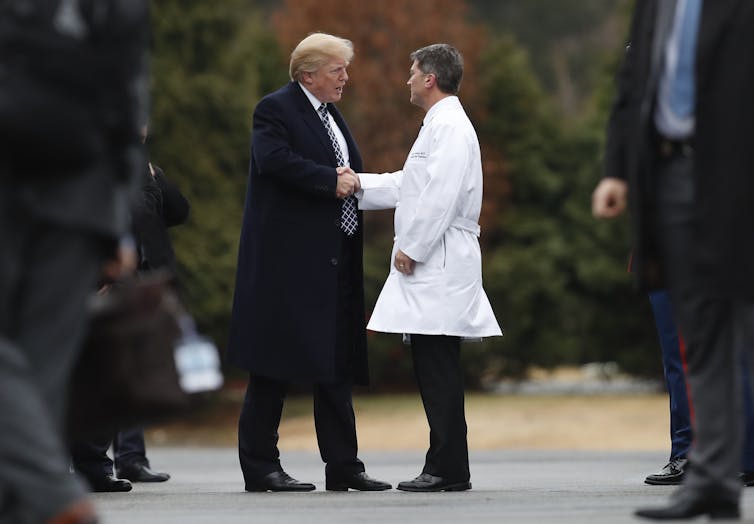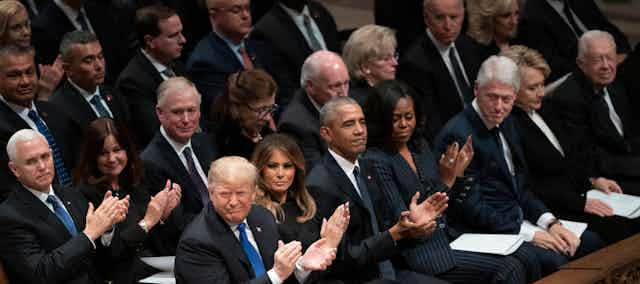Since the beginning of Donald Trump’s presidency, mental health professionals have come forth in historically unprecedented ways to warn against entrusting the U.S. presidency to someone who exhibits what we have called his “dangerous” signs.
The observed signs have included “grandiosity, impulsivity, hypersensitivity to slights or criticism, and an apparent inability to distinguish between fantasy and reality.”
As a psychiatrist and expert on violence, I worked with my colleagues to put our observations into a book, “The Dangerous Case of Donald Trump: 27 Psychiatrists and Mental Health Experts Assess a President,” responding to the hunger for understanding on the part of the public.
I was never interested in domestic partisan politics until it coincided with my concerns for public safety as a violence scholar. As a scientist and physician, my training leads naturally to making conclusions that are based not on ideology or personal preference, but on research evidence and medical needs.
Now, since the Democratic Party will have the majority in one-half of the legislative branch of government and can provide some oversight of the presidency, it seems a propitious time to begin an important, civilizing conversation about mental health in the presidency.
All American military personnel must pass a fitness for duty exam before they serve. Further, those who handle nuclear weapons undergo an especially rigorous screening process that is updated every year.
That United States commanders-in-chief are not put to the same test before they are allowed to lead the troops or to order the use of nuclear weapons is, I believe, a serious omission.

Assessing fitness for the job
Evaluations of fitness, or capacity, or competence, are specific to the requirements of a task or job. The exam can be suited to any job.
The U.S. Army’s field manual, for example, includes elements that are critical for fit leadership: trust, discipline and self-control, judgment and critical thinking, self-awareness and empathy.
One can deduce, for example, that the minimal requirement for a U.S. president is to have the ability to take in proper information and advice, to process that information and to think about consequences before making sound, reality-based decisions.
Fitness for duty tests also assess an employee’s capacity to work without putting their own or others’ health and safety at risk.
In the case of Trump, there have been numerous, concerning signs that suggest he may lack that capacity.
The potential for violence is best assessed through a past history of violence, including verbal aggression and incitement to violence, and a structured checklist of personal characteristics.
Courts and employers may legally request capacity evaluations, which forensic mental health professionals – who practice at the interface of mental health and the law – usually perform. They are independent of the interested parties and are not engaged in treatment with the person being evaluated.
Ideally, these exams would be given before a person takes the job. They can also be ordered after a worker has shown signs of incompetence.
Incapacity is not the same as mental illness. Mental illness per se does not make a person unfit for duty, just as one can be unfit and yet not have a diagnosis of mental disorder. Abraham Lincoln famously suffered from debilitating depression, which may even have helped him to be a better, more empathic leader.

Mental capacity should inform political discussion
Since President Trump took office, news reports have revealed that discussions had been held among GOP members and even high-level government officials about the 25th Amendment. That amendment allows the removal of a president who is unable to discharge the powers and duties of his office.
I have been asked to comment on the applicability of the 25th Amendment to Trump in multiple forums, including to members of Congress.
As a forensic psychiatrist, it is of utmost importance that I make the boundaries of my expertise clear. I should not comment outside my area, but within my expertise, I can speak authoritatively.
The removal of a president because of inability is ultimately a political decision, but politicians and the public would do well to proceed in an informed manner.
Disability, incompetence and unfitness are legal and not mental health concepts. Yet no court of law would consider making these determinations without input from medical experts.
To invoke the 25th Amendment without relevant evidence could also expose the process to endless use and misuse for partisan purposes. Medical expertise can serve as a neutralizing ground. It is based on verifiable clinical observations and uniform standards of practice. A panel of experts could bring forth consensus where there are sufficient, high-quality data.
In the current situation, if the patterns of impulsivity, attraction to violence and detachment from reality we are observing in the president are psychological pathology and not political strategy, it is incumbent on mental health professionals to inform the appropriate authorities, regardless of the context in which they are occurring. Non-experts can then be alerted to the need for more detailed examination.
The 25th Amendment
The proper role of the medical professional regarding the 25th Amendment is to wait for a consultation to be requested and not to interfere in the political process.
However, taking steps to protect the public’s health when there are dangers is very much the health professional’s domain and may entail alerting the public about the need for an urgent evaluation.
Scholars have pointed out at least four instances where the 25th Amendment would have been useful but was not invoked or not available. The most conspicuous example is the case of Ronald Reagan, who may have been suffering from early manifestations of dementia.
Furthermore, White House physicians have covered up presidential impairments in the past.
To avoid this predicament in the future, we can require fitness for duty testing for all presidential and vice-presidential candidates, preferably before they take office and annually thereafter.
In a healthy democracy, it is reasonable for the people to require that their leader meet the minimal mental and physical capacity to serve in the office, and for them to be informed if he or she fails to do so.
Members of the National Coalition of Concerned Mental Health Experts are already in the process of forming a nongovernmental expert panel, based purely on medical criteria, to serve in a rigorous consulting role if called upon or to advise on the need for urgent assessments.
We believe that President Trump’s numerous signs of impairment have long called for an urgent evaluation.
In addition to a capacity evaluation, a thorough neuropsychiatric examination would help us to understand better if the president’s behavior will continue or rapidly grow worse.
Mental pathology can be powerful when severe. Decisions about impeachment or other measures to contain the dangers that Trump – or any other president – could present should not be made without this information.

